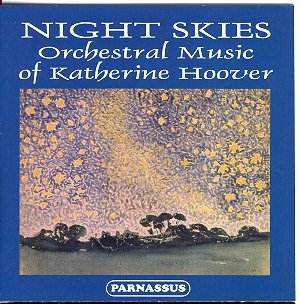AVAILABILITY
www.parnassusrecords.com
Trained as a professional flautist and leading
a busy career as conductor and flautist, Katherine Hoover is also
a distinguished composer with a sizeable body of works to her
credit. Though she has composed much music for flute, she has
also written some substantial orchestral works, some of which
are recorded here. Besides the pieces featured here, she has the
following to her name: Clarinet Concerto Op.38 (1987),
Stitch-te naku Op.47 (1994) for cello and orchestra,
a Nocturne for flute and strings, a piano quintet
Da Pacem (1988) and a string quartet, to name but
a few. Information concerning the life and works of Katherine
Hoover may be found on the www.papagenapress.com
website.
Eleni Gatzoyanis was tortured and executed by
Communist partisans for smuggling her children out of Greece to
join their father in the States. This happened in 1948 at the
end of the Greek Civil War. Her son, eight at the time, became
an investigative reporter for The New York Times. In the
early 1980s, he returned to Greece to trace the events leading
to his motherís death. As a result of this trip, he later published
a book Eleni about his mother. Eleni: A Greek Tragedy
Op.36 is Hooverís personal response to the events depicted
in the book. Thus, the work is both "a lament and a tribute"
(the composerís words). Part of the score uses Greek folk music,
particularly that from Epiros, the region where Eleni lived. This
is clearly heard in the opening section replete with folk-inflected
tunes, at times accompanied by hand clapping. This almost innocent,
nostalgic music dissolves into a dark-hued dirge, using some controlled
aleatory elements, building to a massive climax out of which the
opening folksy tune re-emerges to introduce the deeply moving
final lament (wordless mezzo-soprano and orchestra). This is undoubtedly
a heartfelt, sincere piece of music of great communicative strength.
The Double Concerto Op.40 for two
violins and strings is comparatively more relaxed in mood and
more traditional, by 20th Century standards. The music
is predominantly tuneful, lyrical and often playful with some
discrete whiffs of jazz. It has much in common with, say, Malcolm
Arnoldís own Concerto for two Violins and Strings Op.77,
particularly so in the musicís restraint and understatement. A
worthy addition to the repertoire, cleverly eschewing any superficial
Neo-classicism, and again quite accessible, as are the other pieces.
Two Sketches Op.42, begun in 1985
and completed in 1989, is a contrasted diptych of short orchestral
studies: Winter Sands is a beautiful seascape whereas Turnabout,
actually a study in palindromic writing, is altogether more extrovert
and brilliant.
The somewhat more recent Night Skies Op.46
is by far the most ambitious and most substantial work here. This
beautifully atmospheric Nocturne was partly inspired by Henri-
Edmond Crossís watercolour Landscape with Stars which appropriately
enough adorns the cover of this disc, but also by Ryderís nightscapes
and the composerís own visual impressions. The resulting work
is a wonderful piece of brilliant, colourful, impressionistic
orchestration displaying Hooverís orchestral mastery in the most
convincing manner.
I for one was particularly impressed by Katherine
Hoover the composer whose music Ė of course Ė was new to me and
who is a most distinguished composer with a remarkable orchestral
flair, who has obviously things to say and who knows how to say
them in the best possible way. I would certainly like to hear
more of her orchestral music.
Hubert Culot
